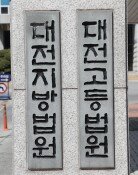Widow Puts Husbands Firm Back on Track
Widow Puts Husbands Firm Back on Track
Posted December. 03, 2005 04:48,
In November 2002, an elementary school teacher named Song suffered after her husband Yi In-dong, a business card management software developer, died from overwork at the age of 45.
Yi was a senior researcher at the artificial intelligence research center attached to the Korea Institute of Science and Technology (KIST). He invented a Geulnun program which allows users to manage business cards as a personal information file by recognizing letters in business cards and then converting them to texts.
He founded a venture company with 40 employees and recorded 8 billion won in annual revenue but Yi was carried off in exhaustion and due to overworking two months before the companys initial public offering (IPO) at KOSDAQ.
Song had to bear the grief of losing her husband alone. Her eldest daughter, Hye-jin (17), soothed her crying mother in the middle of the night. Her second daughter, Hye-in (13), and the youngest daughter, Hye-ryeong (8), could not feel the loss of their father.
The company immediately became unstable. Sales plummeted with the loss of Yi, who led the R&D and sales, driving the company into a one billion won bankruptcy. The price of shares which were being sold briskly on the KODAQ market also nosedived to a quarter of the price.
It occurred to me that my late husband might be heartbroken to see me wandering. Song quit her 18-year-long job as a teacher and started to manage the company. She appealed to the employees saying, I promise to call you back when the company turns around. She only retained the R&D team; reducing the number of employees to 14.
Even though the absence of her husband was greatly felt, she took the lead in boosting technological competitiveness and expiring new markets. Employees worked ceaselessly overtime and even on holidays.
After one year of hard work, the company was able to release Hi-Name, which can recognize letters 100 percent. Hi-Name is a business card management solution where scanned business cards are automatically stored as business card files, and users can print them in various formats based on customer needs and send them to a group or an individual via e-mail.
Hi-Name 3.0 Pro drew huge popularity in Daejeon where many venture companies are located. About 90 percent of the representatives of venture companies purchased the product because they recognized its technology. The Korea Electric Power Corporation, Koreas biggest public corporation, built an electronic system based on Hi-Name 3.0 for all of its employees in November.
The estimated sales for this year rose to 2 billion won, 10 percent up from last year. This is the first upward trend for the company since Song took the vacant position of her husband three years ago.
In a recently published book, How Come Women Have Become CEOs? that contains stories about Koreas female CEOs, she sent a letter to her late husband as follows.
I use the same desk and chair, even the same phone number that you left. Sometimes the burden is so heavy that Im faltering and short of breath, but I believe it weighs lighter than our love. Please help us make a happy company, and lend me your power to raise our children in a healthy and right way.
Ki-Jin Lee doyoce@donga.com






![[속보]美 “미국인은 이란 당장 떠나라” 대사관 긴급 공지](https://dimg.donga.com/c/138/175/90/1/wps/NEWS/IMAGE/2026/01/13/133147285.1.jpg)
